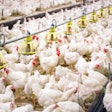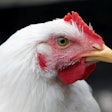The practicality of using the sun’s energy to power a modern broiler house is being put to the test in a three-year study on a Laurel, Delaware, broiler farm. A partnership of government agencies, private enterprise and the University of Delaware has been formed to put solar power to the test in a real-world, on-farm situation.
The farm, which is owned by Allen Family Foods, has five broiler houses on it, but only one will use solar power. In total, the solar panels on the farm can generate up to 42 kilowatts of electricity. This is more power than is needed to run the broiler house, and the additional power will be used to charge batteries and sell electricity back to the power grid. The batteries can be used to power the house when the sun goes down; and, if necessary, power can be pulled back off the grid. Emergency power can also be provided by the farm’s fossil fuel-powered backup generator.
 MD solar house
MD solar house
The system being tested on the farm was built by WorldWater & Power Corp., with help from the University of Delaware, at a cost of $500,000. Chris Schering, vice president of national accounts for WorldWater & Power Corp., said future farm installations, without all of the monitoring equipment and surplus generating capacity, would cost one-half to two-thirds to equip. Future installations may or may not use batteries. Since utilities do not all have the same rate structures, whether or not it would be economical to have a battery system could depend on local rate structures.
Some federal and state tax credits and rebates are available to help fund alternative energy projects like this solar system. It is expected that tax credits and rebates will offset over half of the cost of this project, which is being paid for by Allen Family Foods. Schering said that after considering tax credits and rebates, which vary by state, and depending on local electric rates, a solar-powered, electric-generating system for a poultry farm could pay for itself in as little as four years. Commercially available solar systems are warranted for 25 years, according to Schering.
The farm, which is owned by Allen Family Foods, has five broiler houses on it, but only one will use solar power.
A solar-powered, electric-generating system for a poultry farm could pay for itself in as little as four years.











